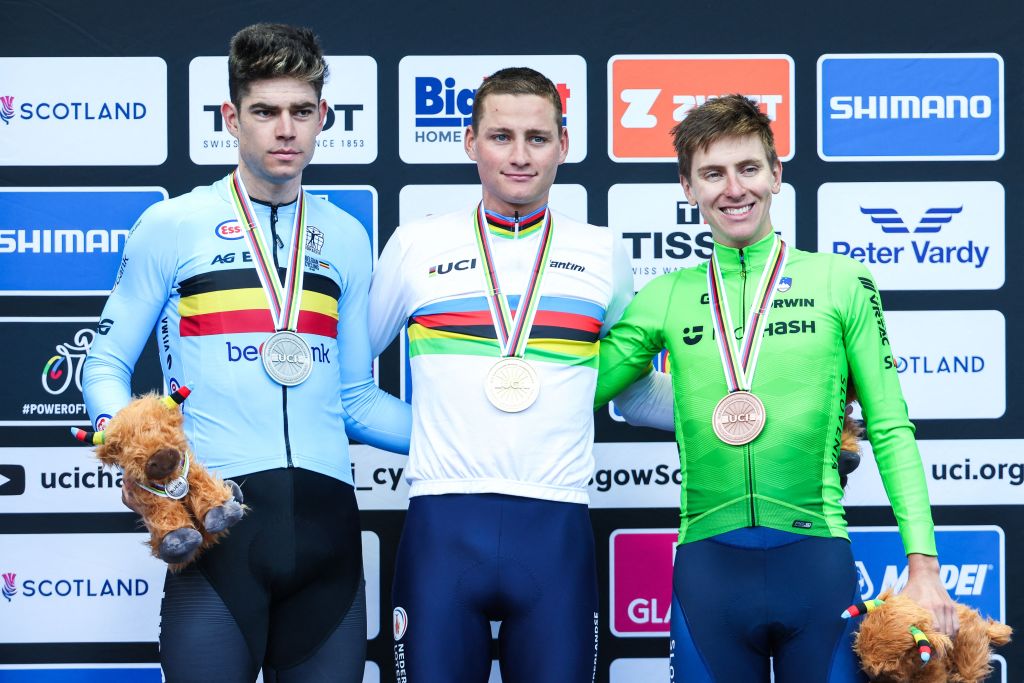
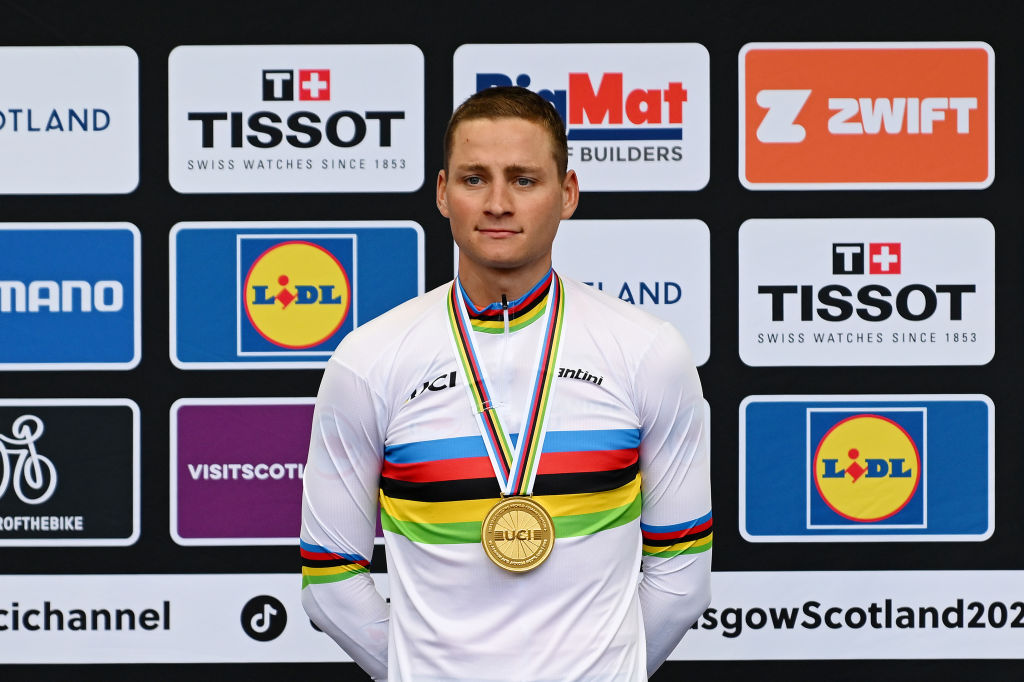
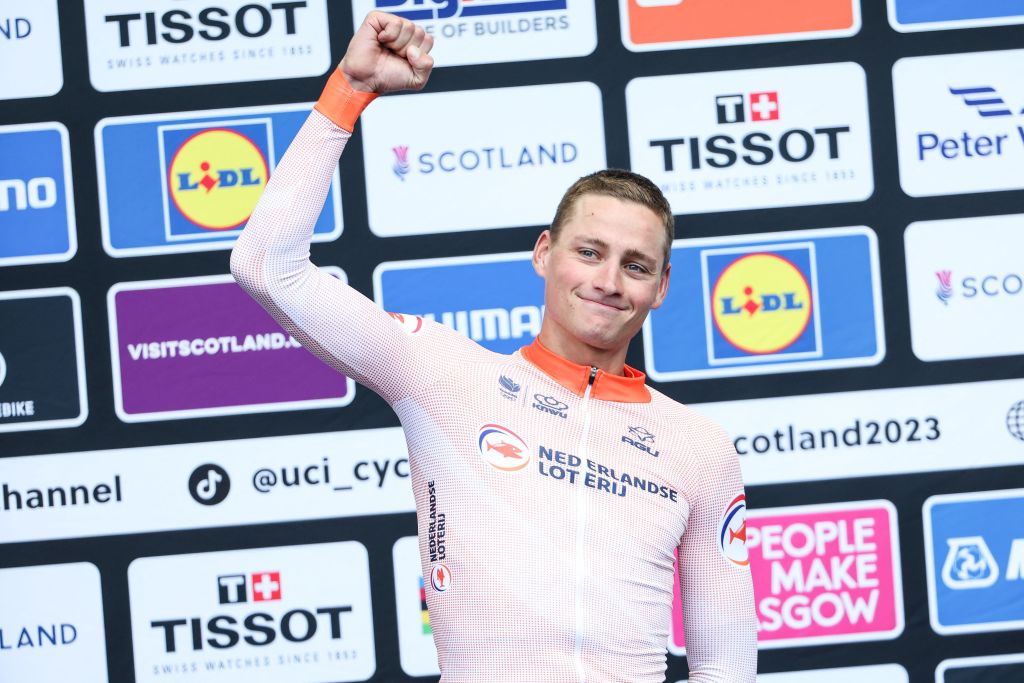
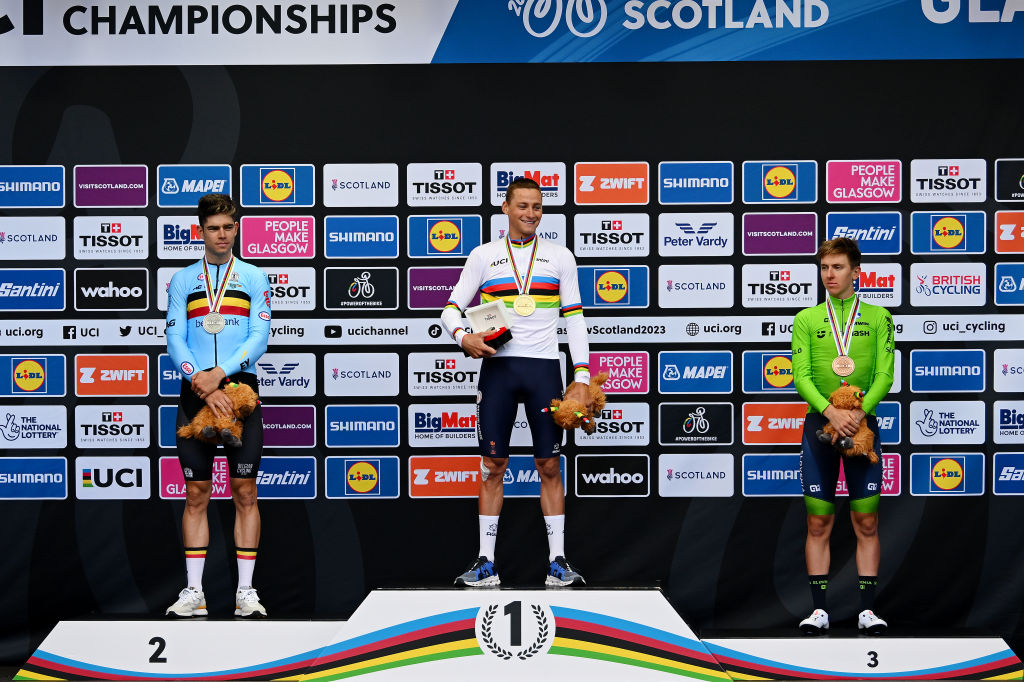
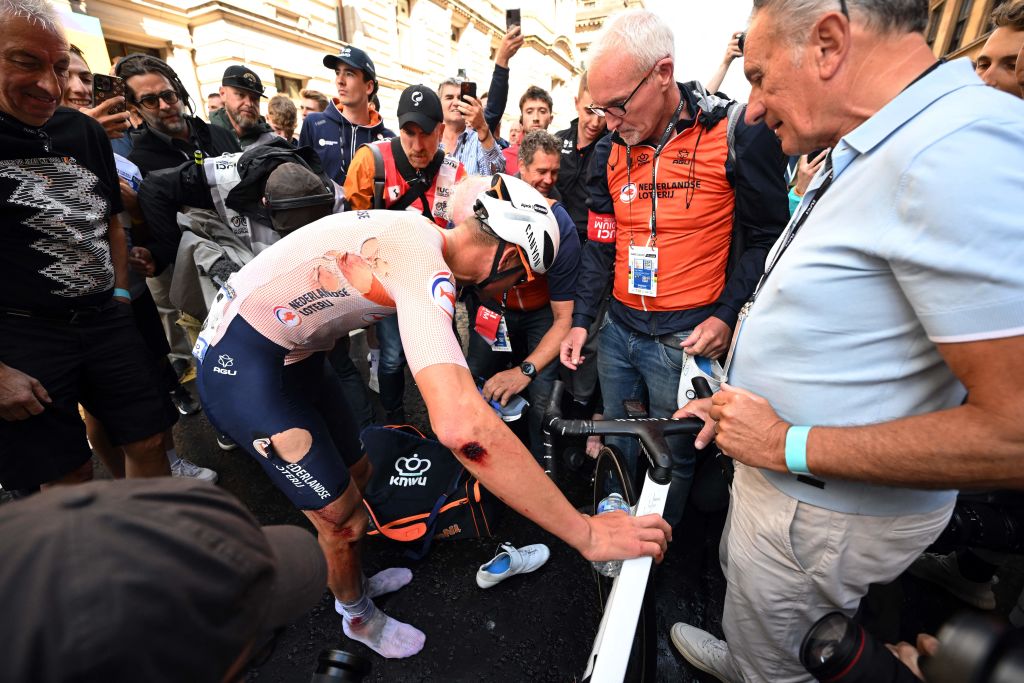
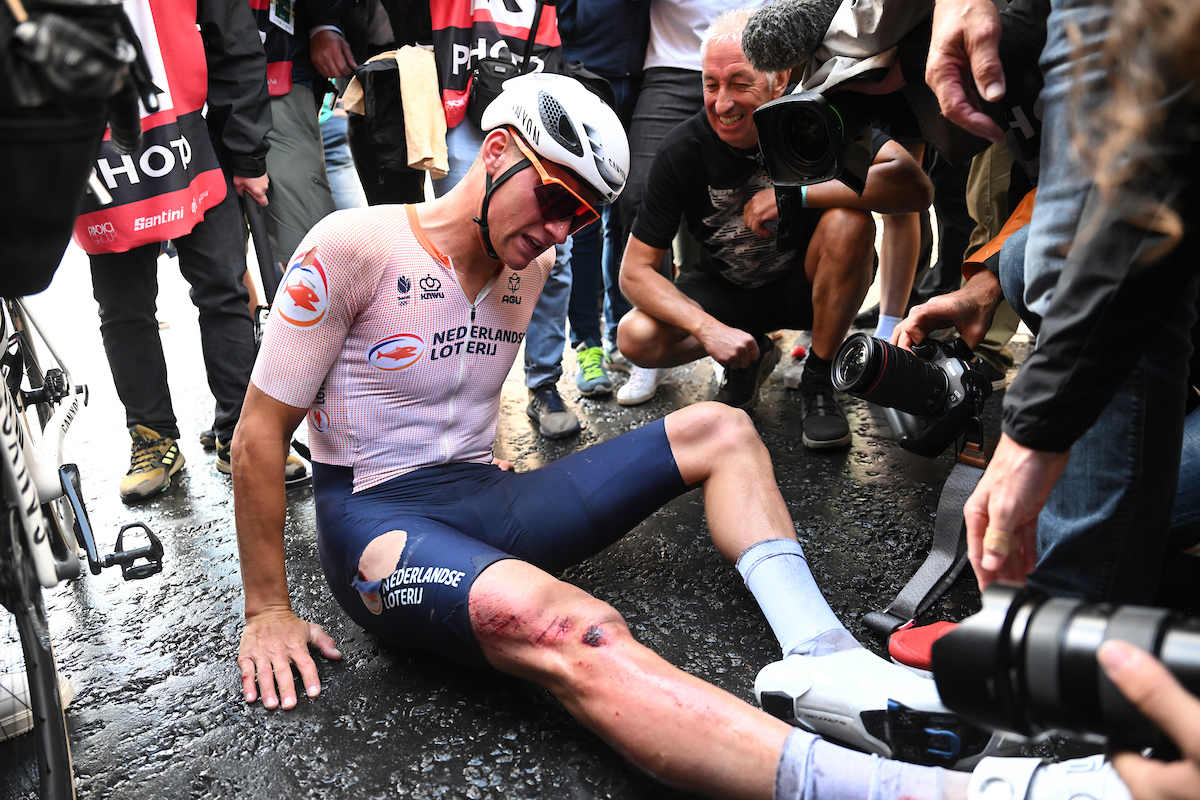
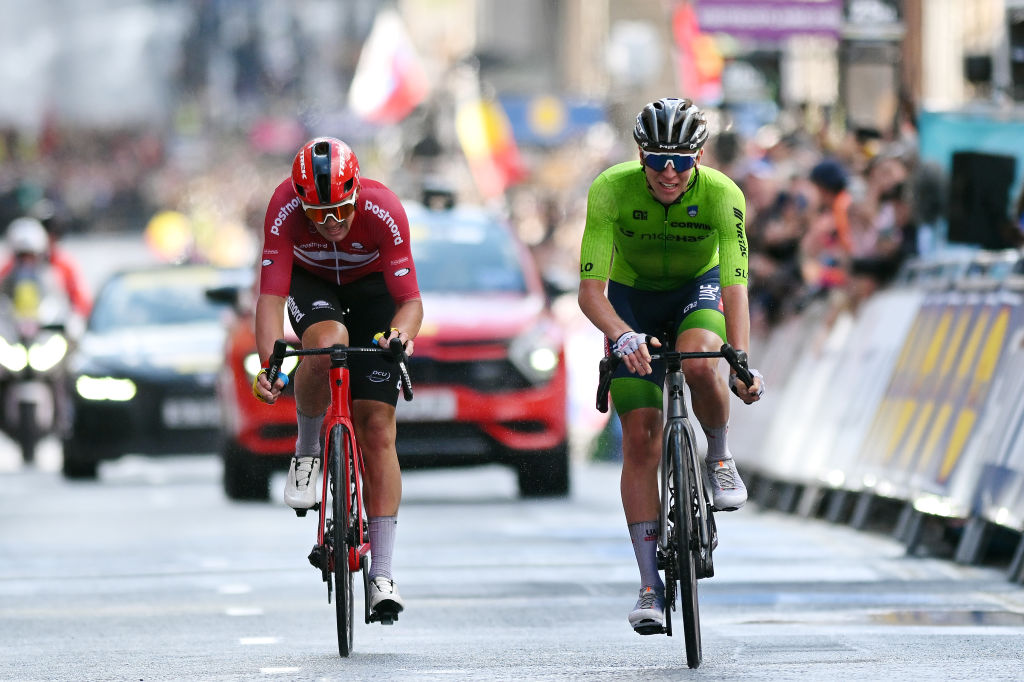
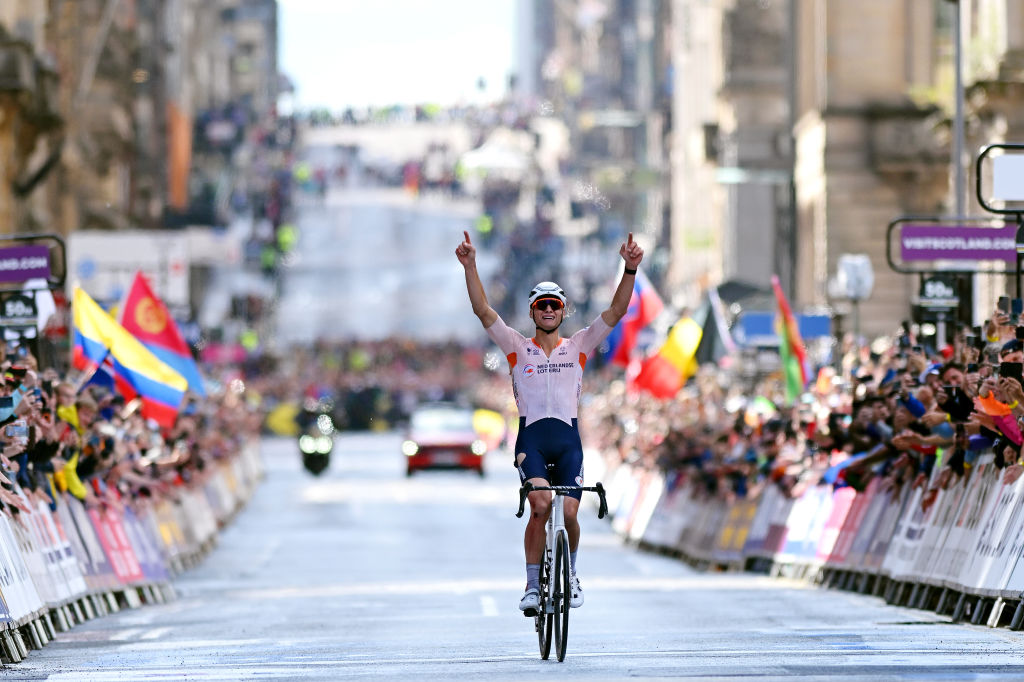
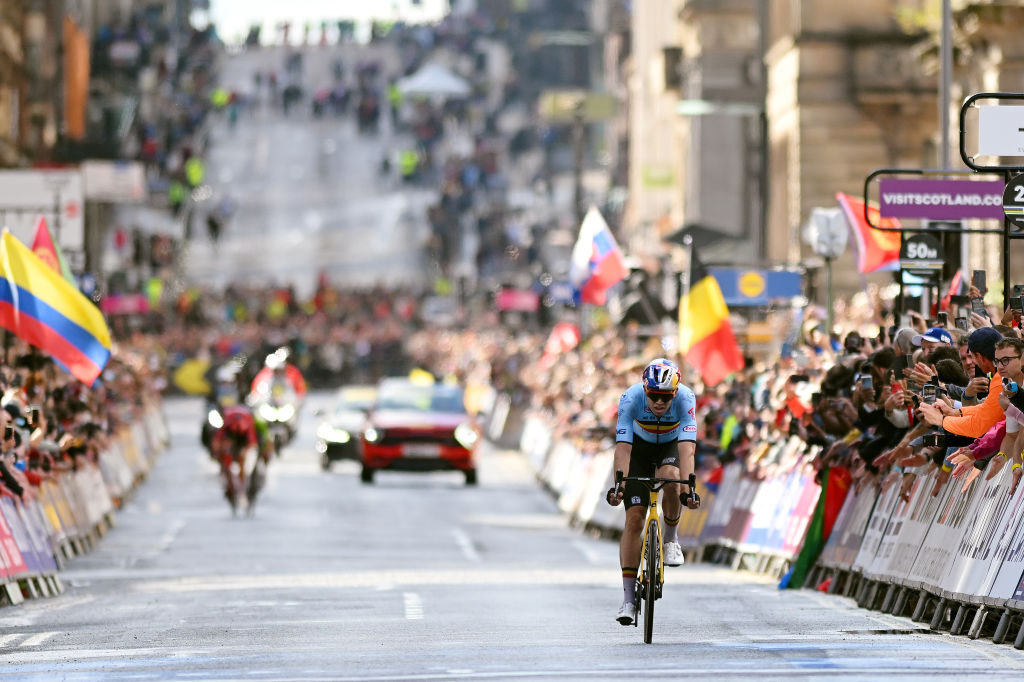
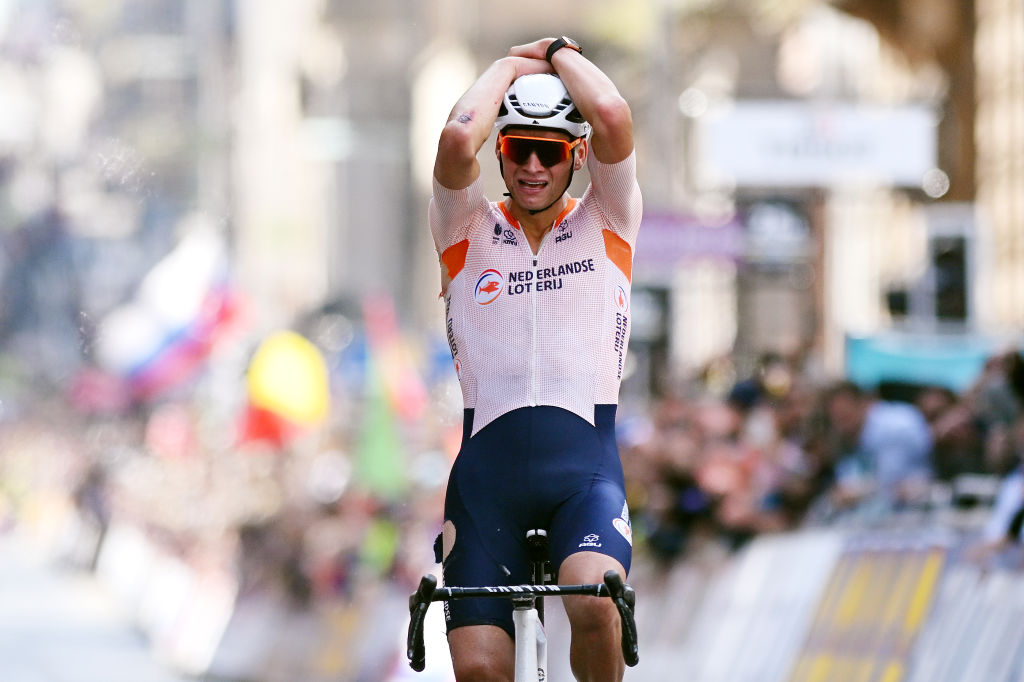
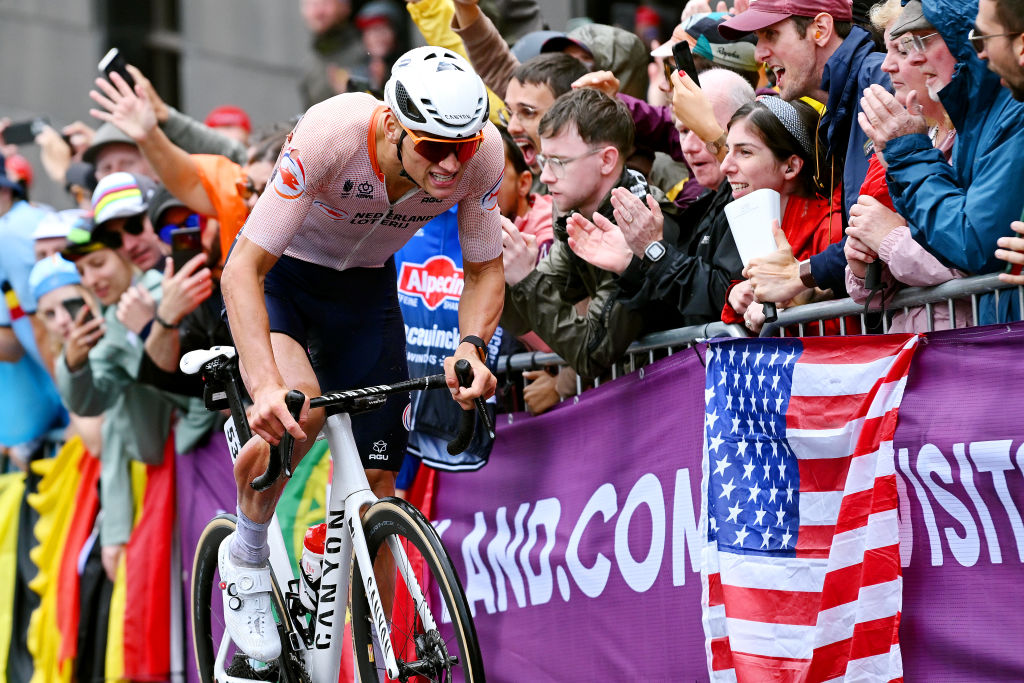
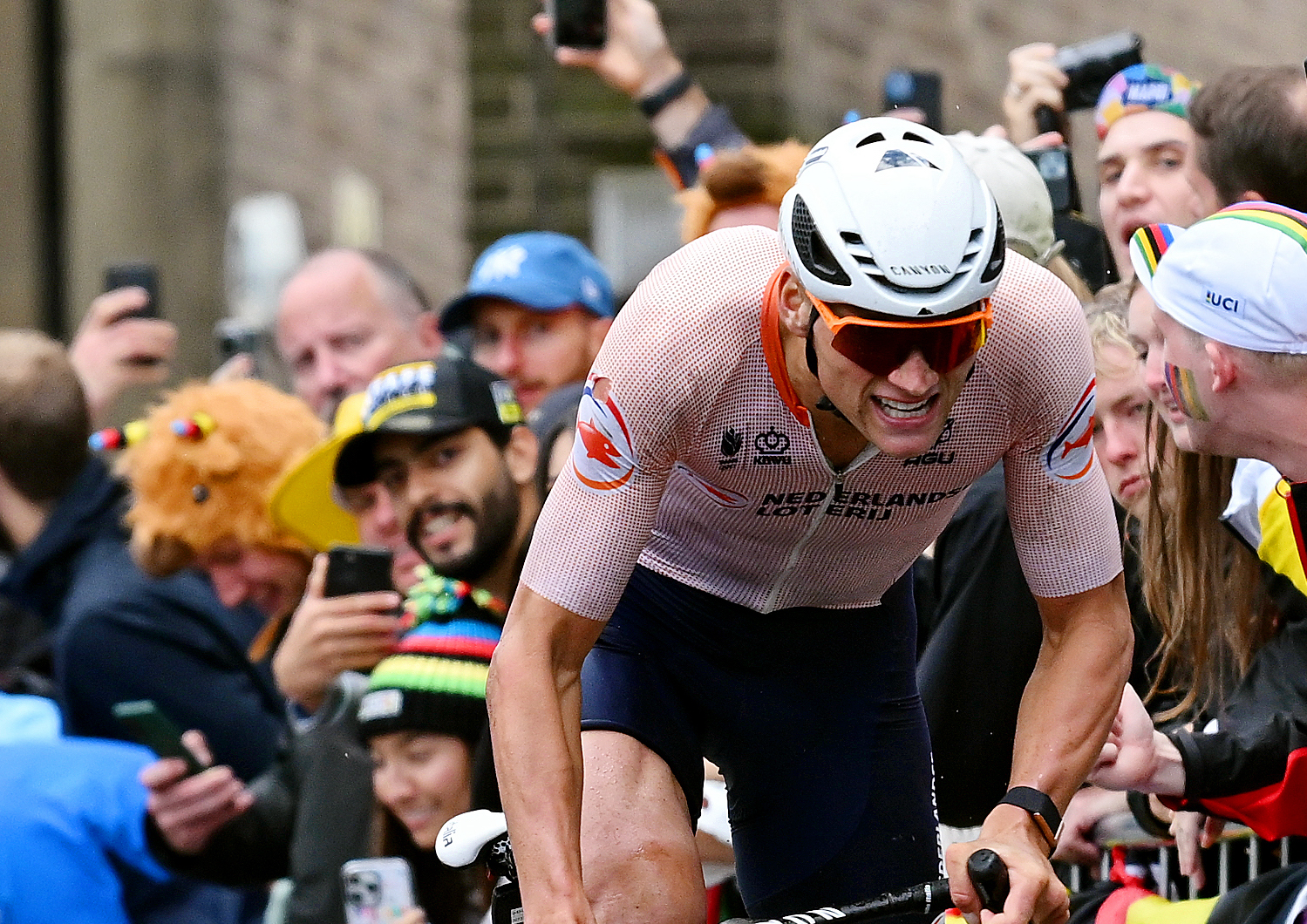
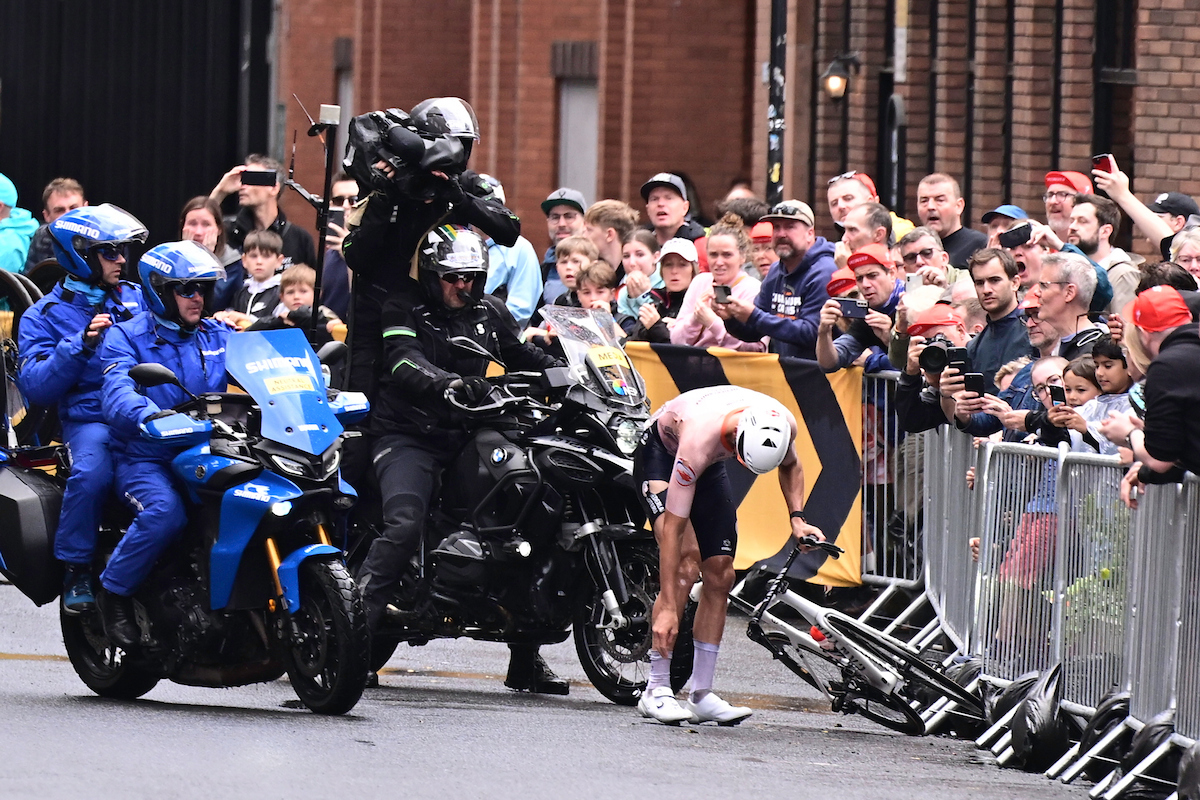
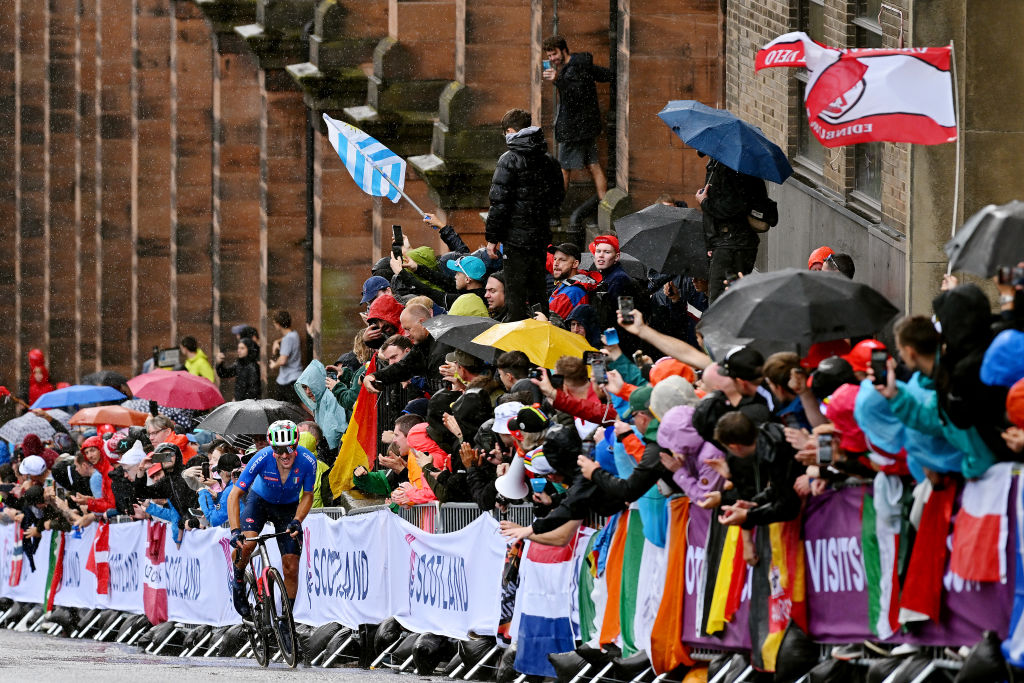
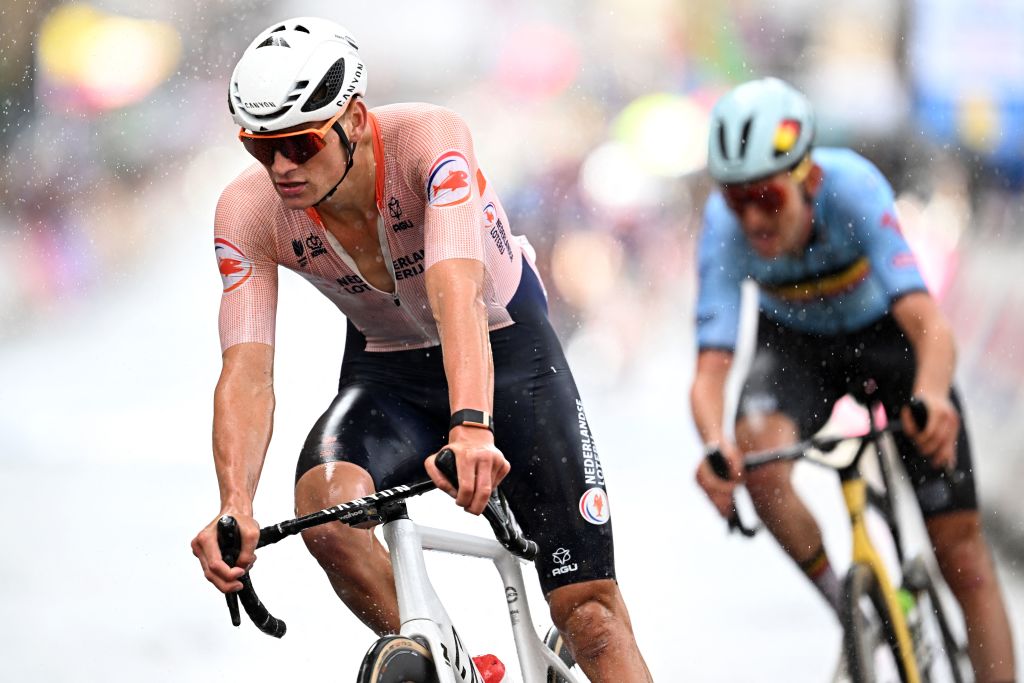
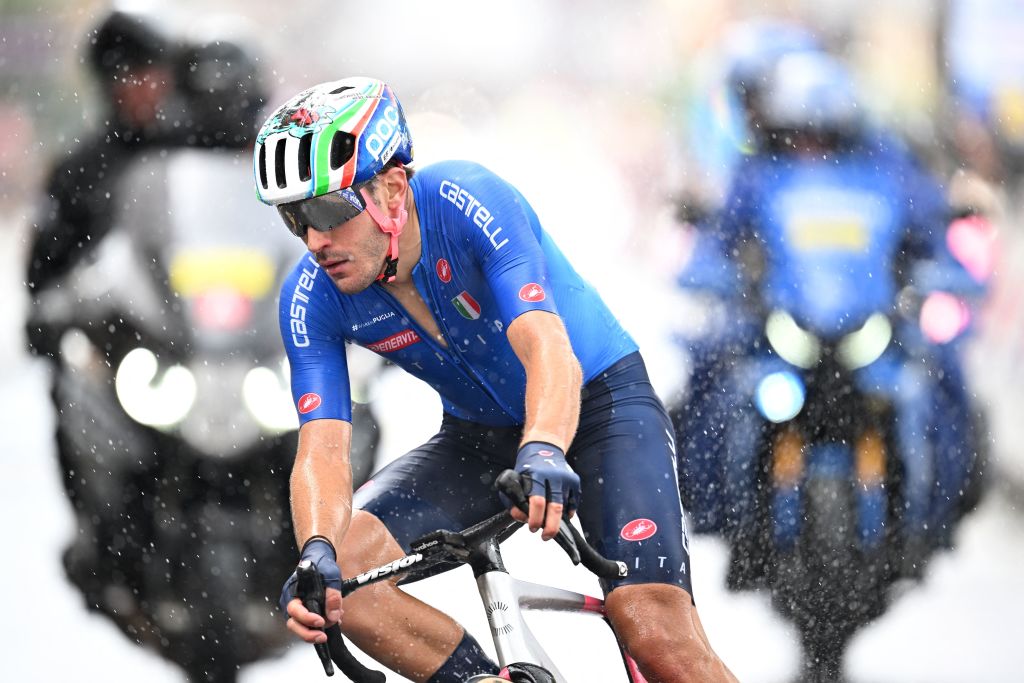
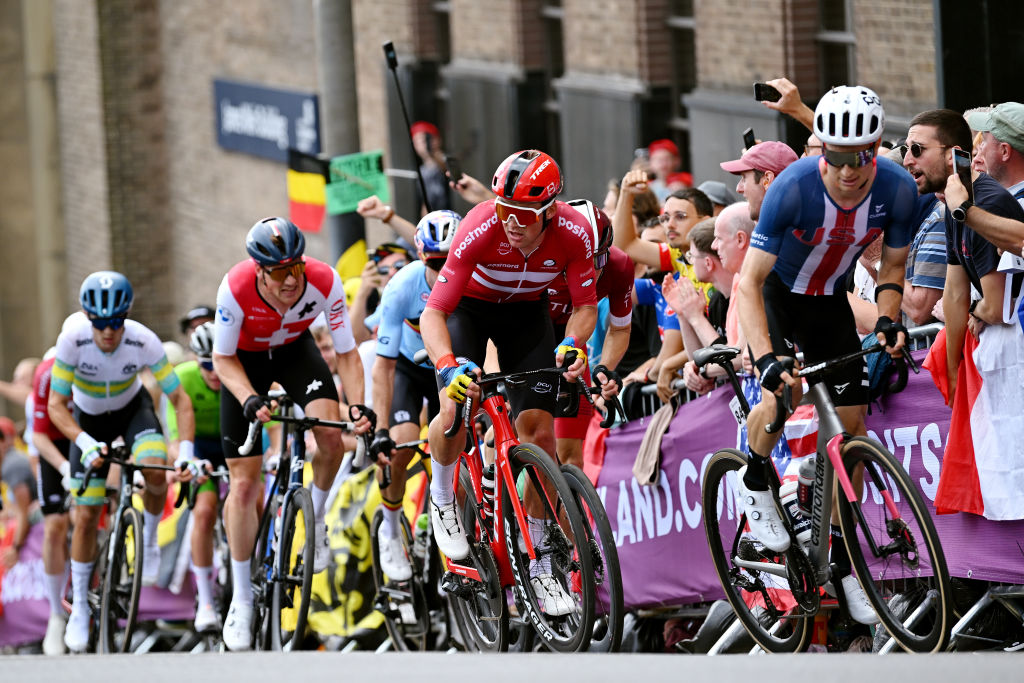
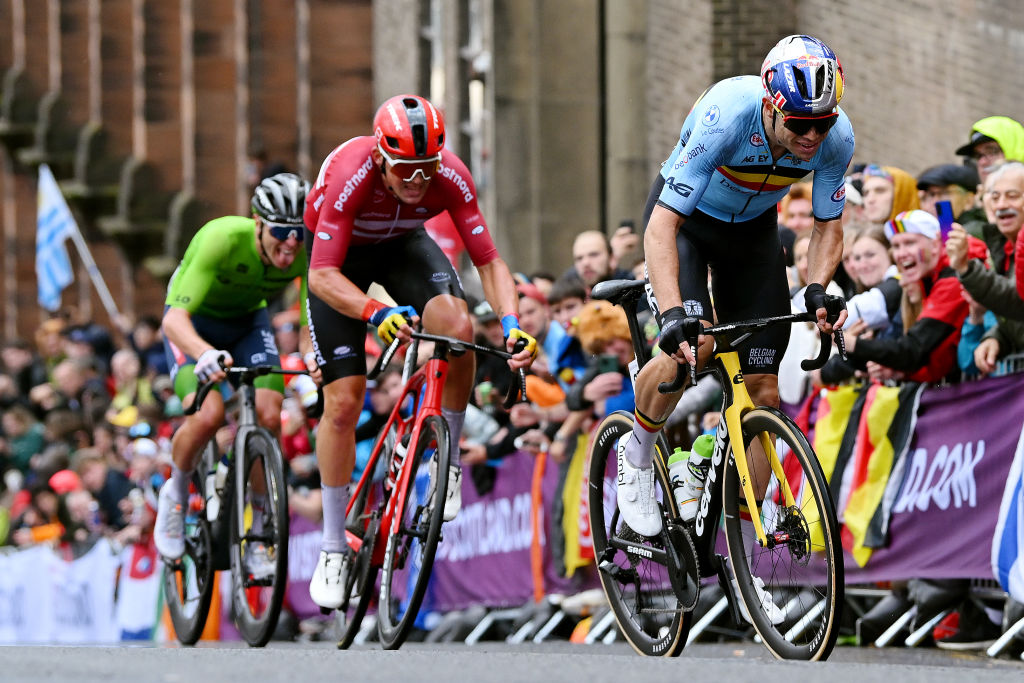
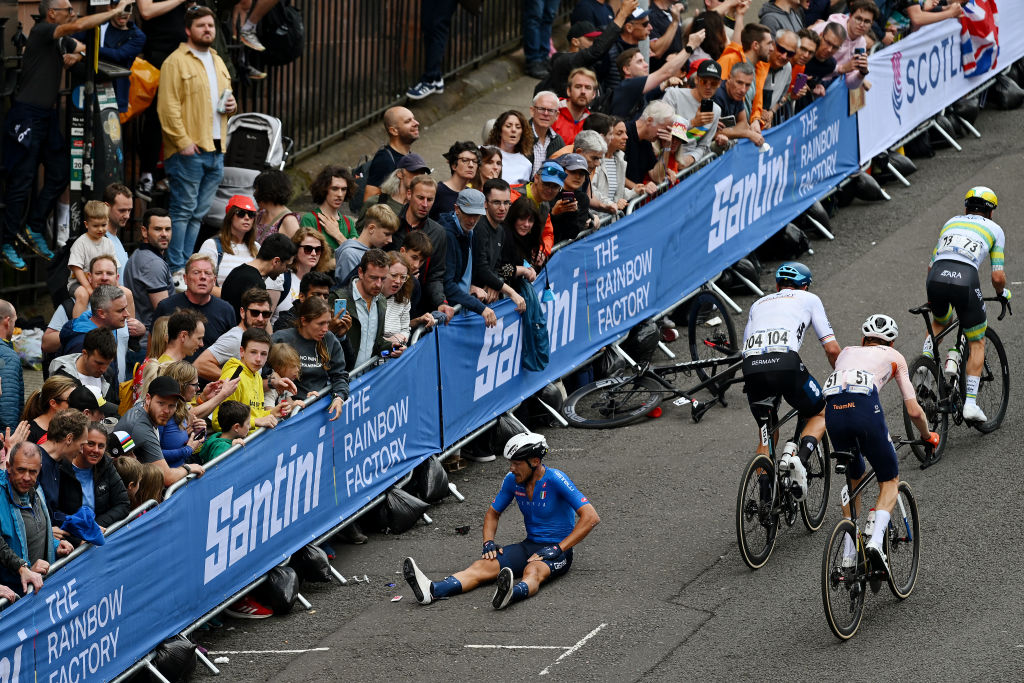
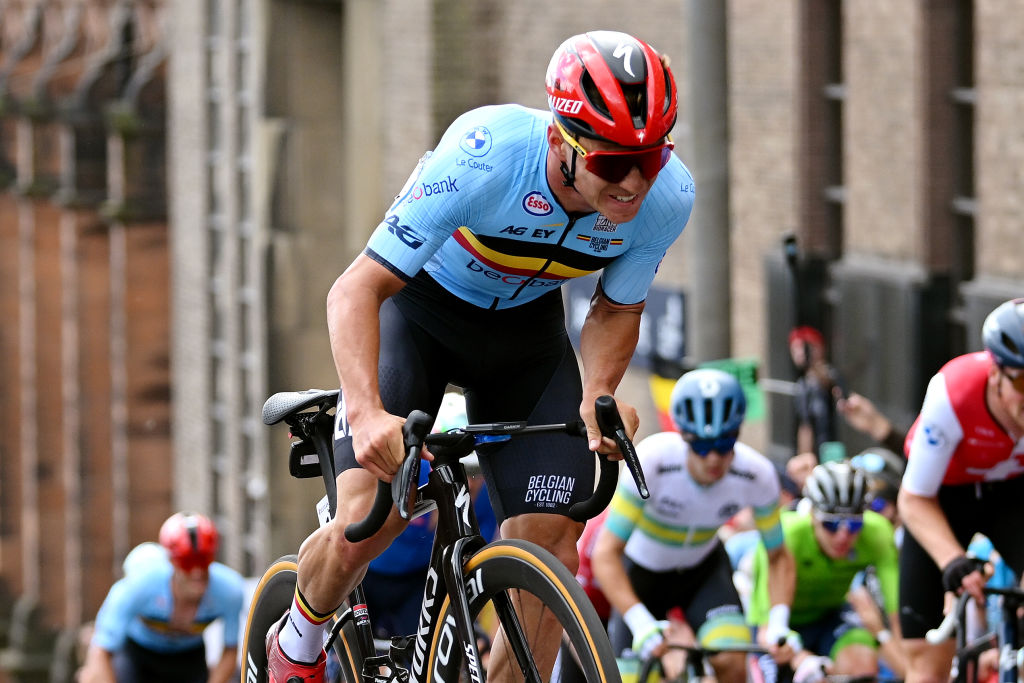
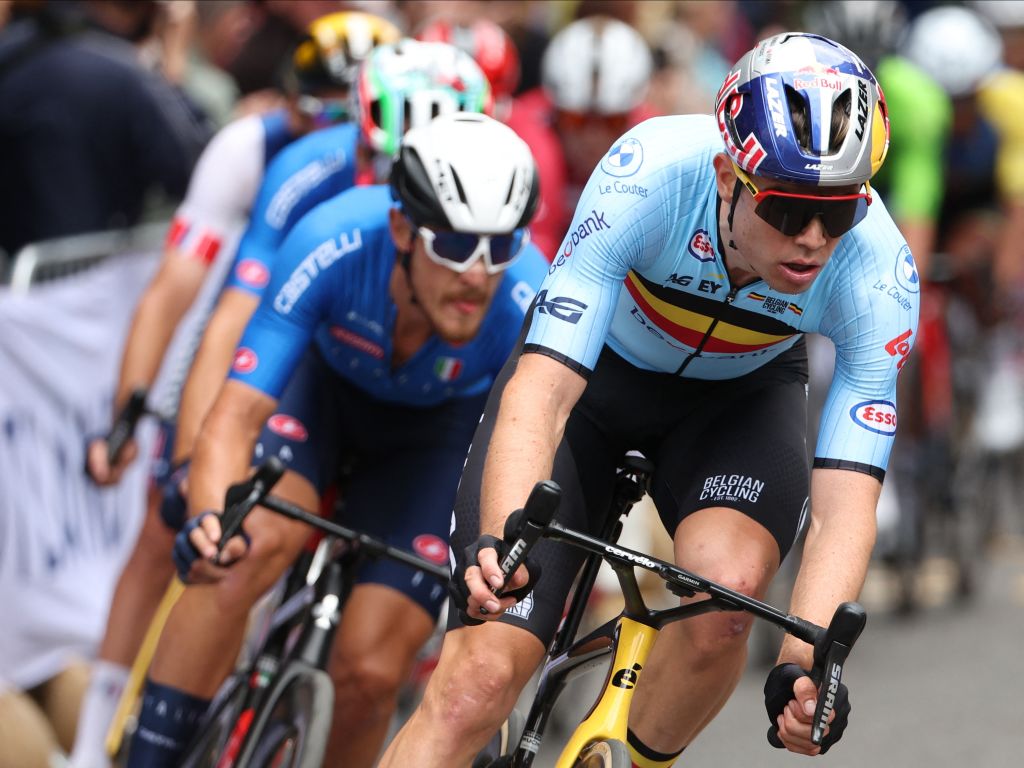
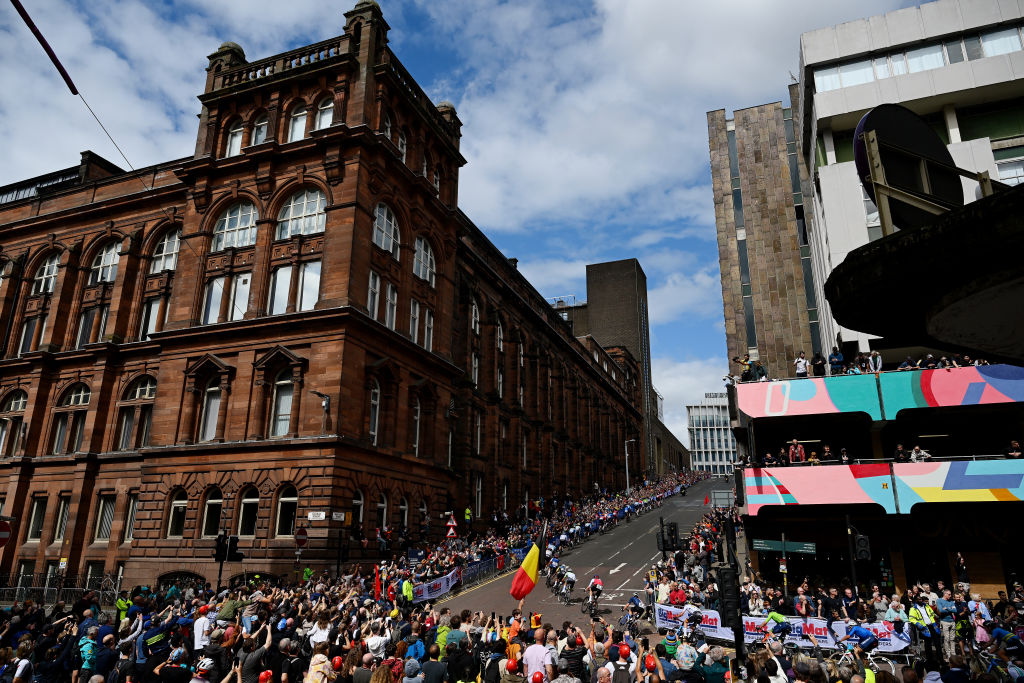
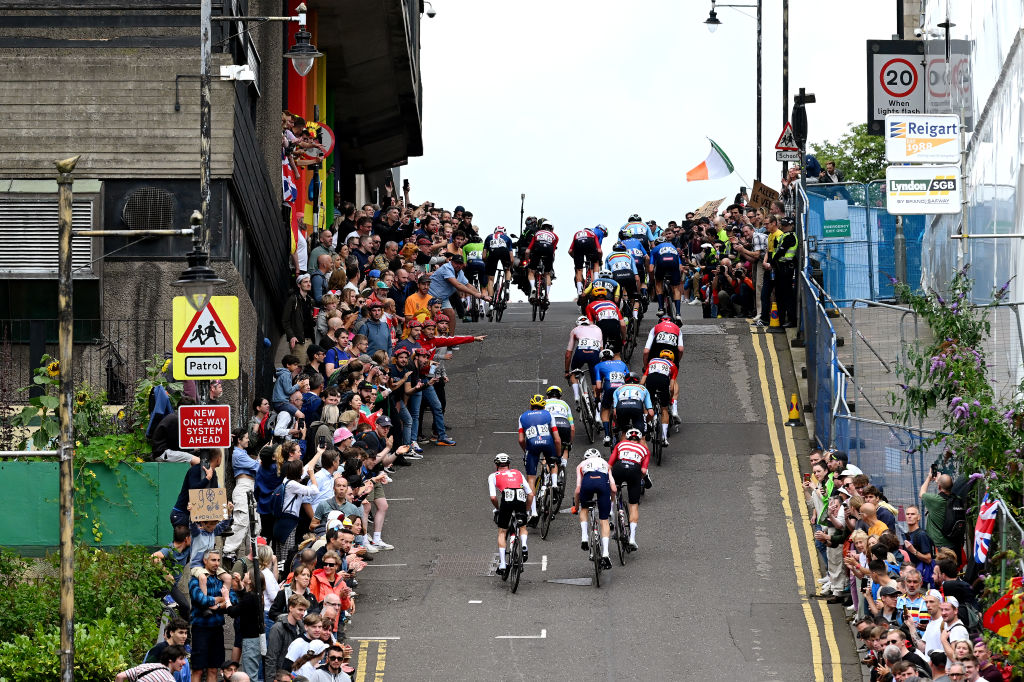
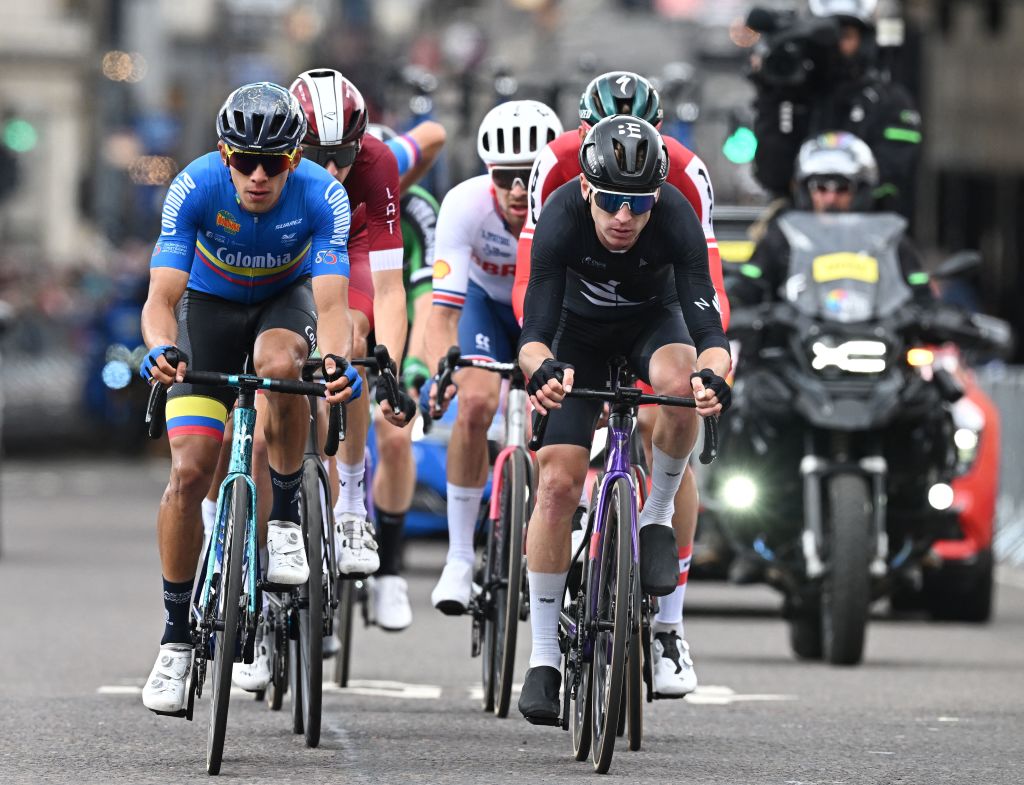
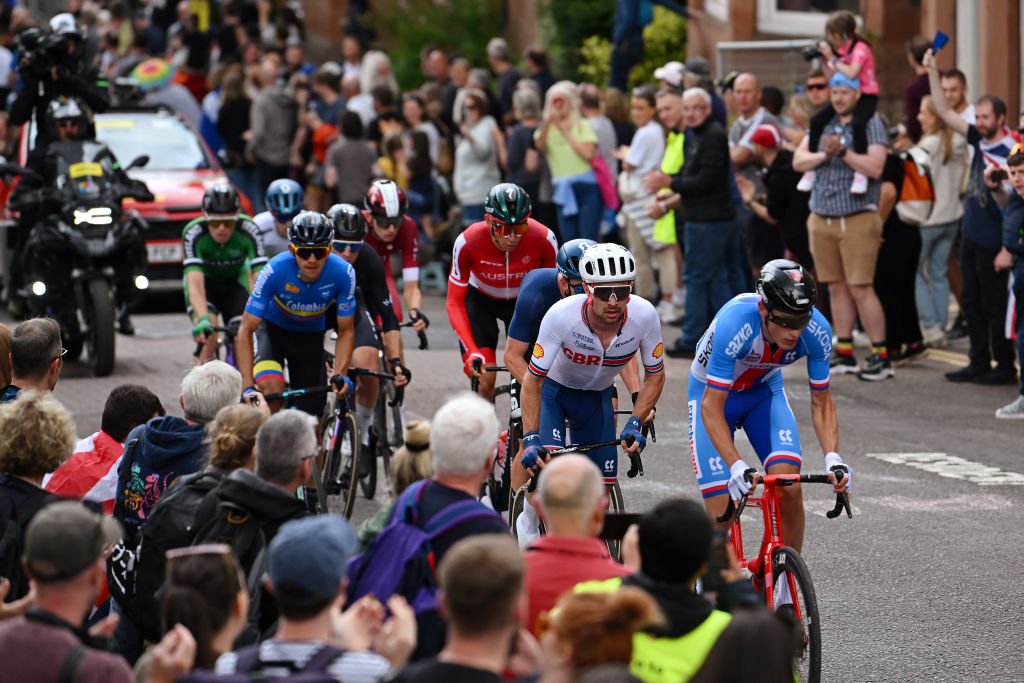
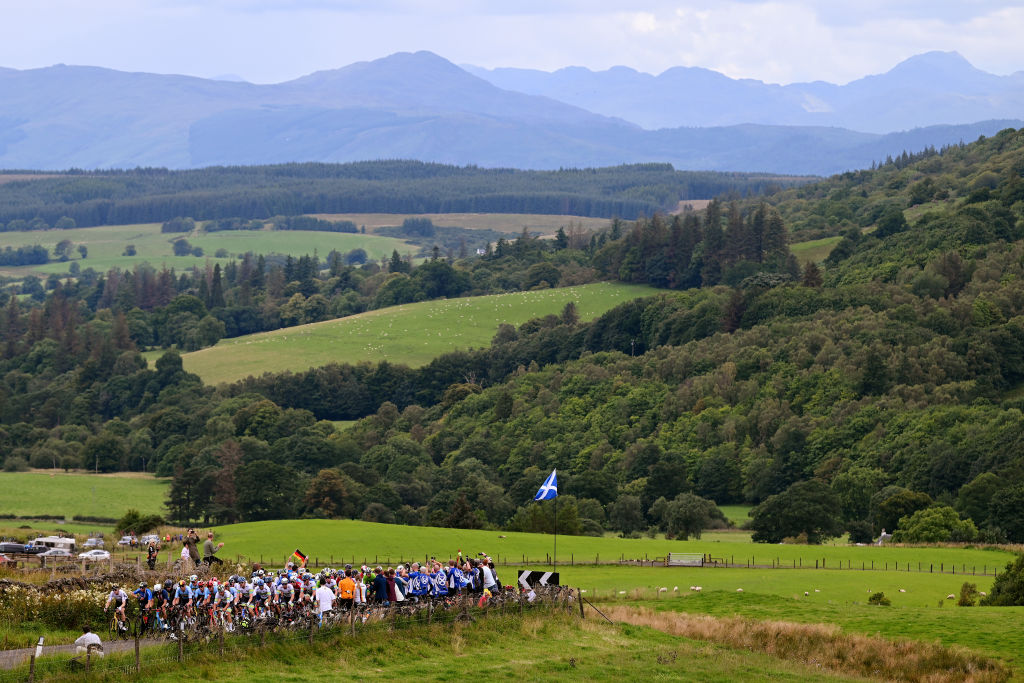
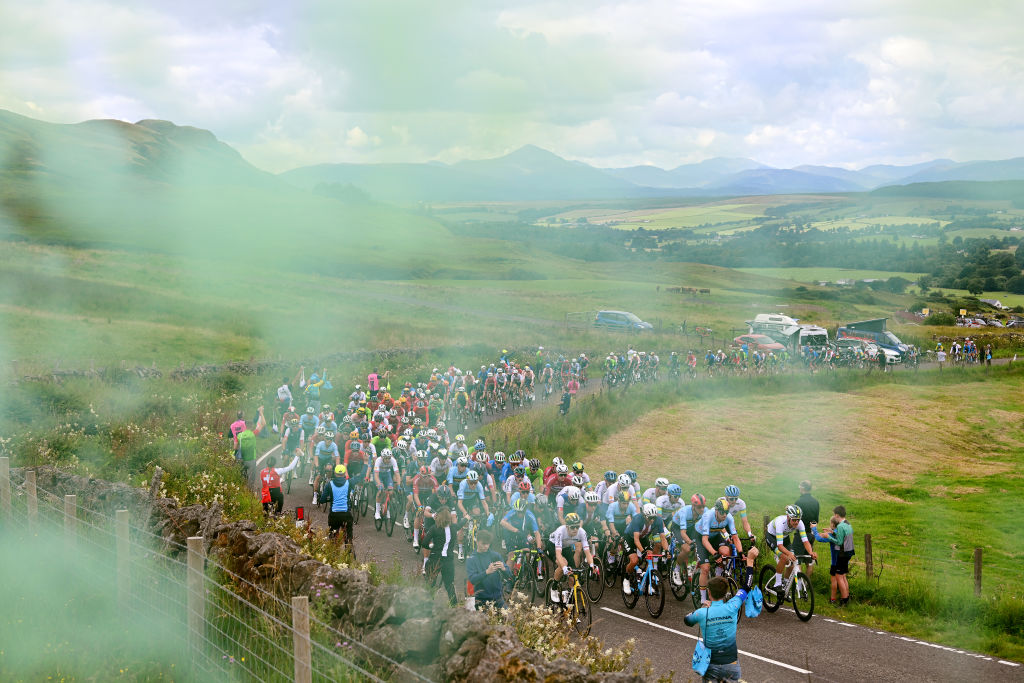
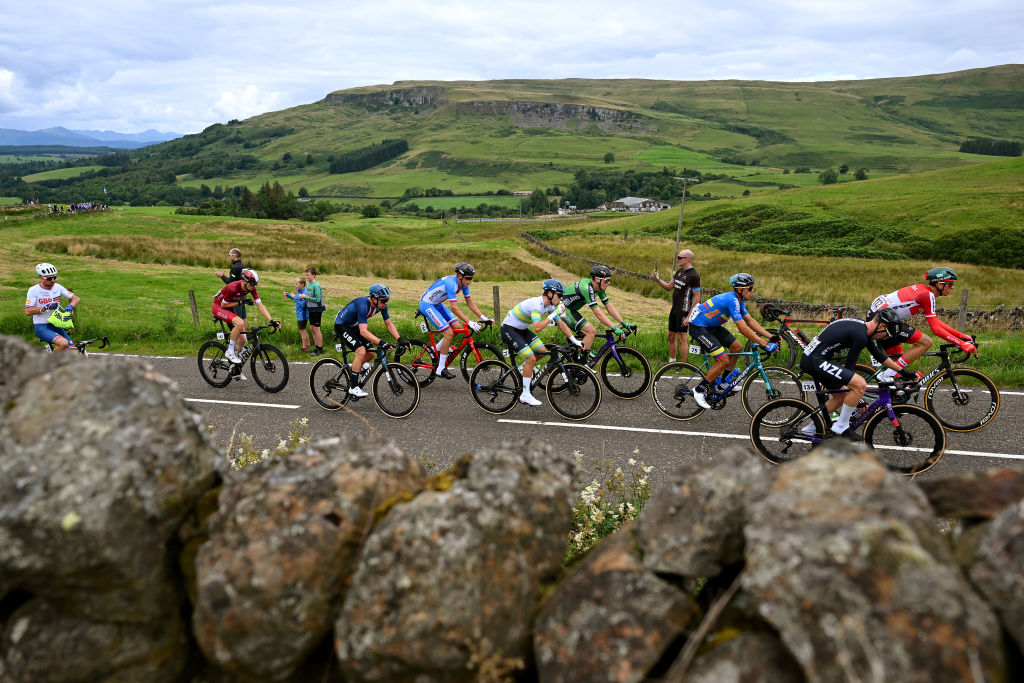
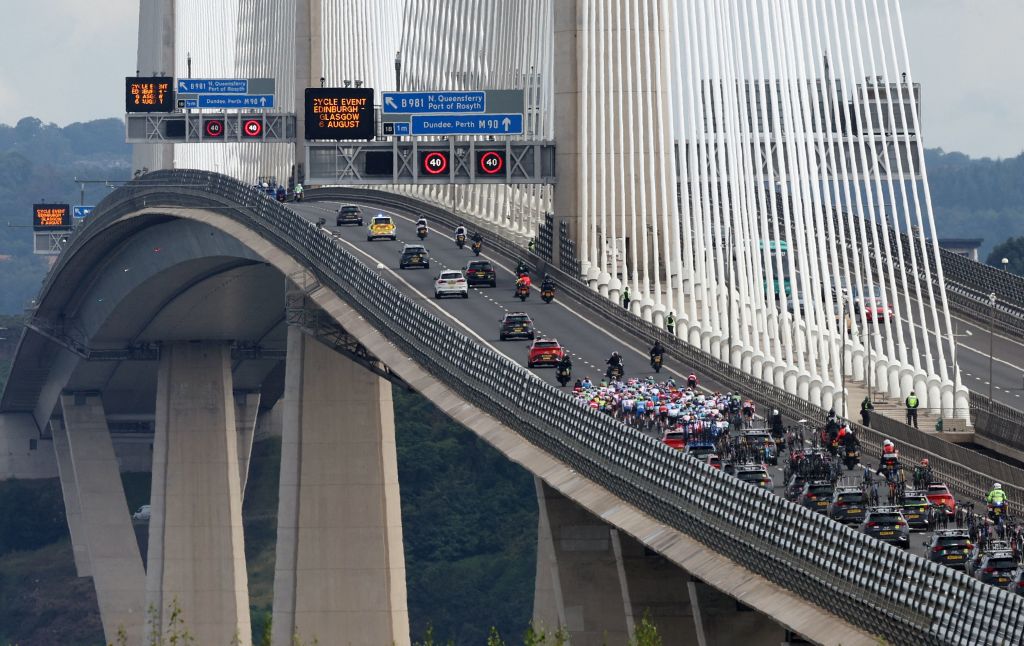
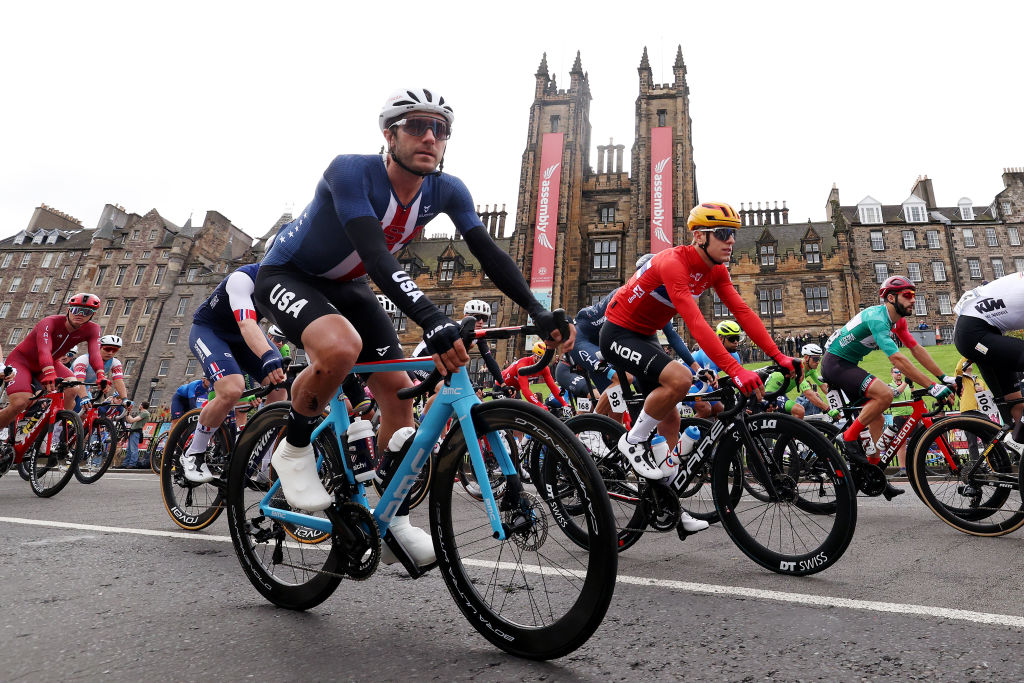
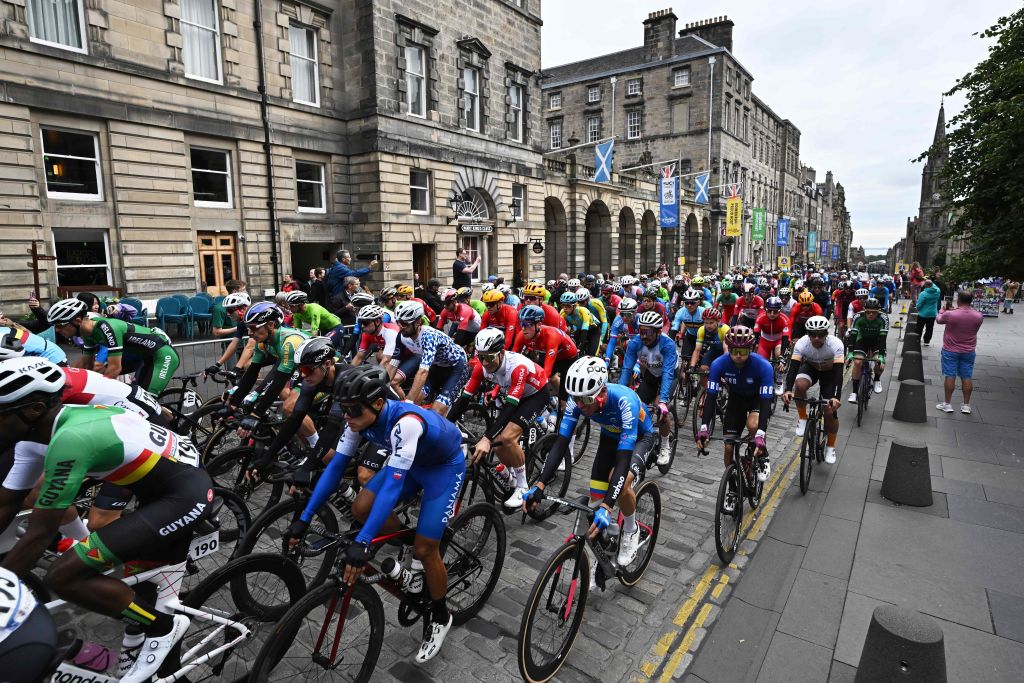
Mathieu van der Poel of the Netherlands jumped from a select group to a solo victory at the thrilling Elite Men’s race at the UCI World Road Championships in Glasgow, beating his closest competitors by almost two minutes.
Belgian’s Wout van Aert claimed silver with Tadej Pogačar (Slovenia) outsprinting Mads Pedersen (Denmark) for bronze.
In an incredible performance, van der Poel survived a late crash on the streets of the Glasgow city centre, made slippery by off-and-on rain.
After quickly getting back on his bike, the Dutch calmly fixed his shoe and continued to increase his gap on his way to victory with a ripped skinsuit and a bloody knee and hand.
Van der Poel attacked from a group of chasers to catch and pass Alberto Bettiol (Italy) with 22 kilometres to go on the twisty 14km Gasgow circuit. The trio of van Aert, Pogačar and Pedersen worked hard to catch him but with one lap to go, it was obvious that they were playing for the lower podium places.
Van der Poel claimed his second world title, after winning the UCI World Cyclocross Championships earlier this year. No other male cyclist has ever achieved this in the same year.
Van der Poel had to hold back the tears on the podium after pulling on the rainbow jersey.
“It means everything. It was one of the biggest goals I had left, and to win it today is amazing,” he said.
“It completes my career in my opinion. For me, it's the biggest victory on the road. I cannot yet imagine wearing the rainbow for a year.”
He then talked about his race tactics and his winning attack.
“I knew that this was the hardest moment of the race especially because you had a downhill and immediately the next bump. I felt still pretty strong at the end and I noticed the rest was a bit on the limit,” he said.
“Then when I went away, I didn’t expect to have a gap immediately but when I saw nobody was following, it gave me wings. I was just flying around the course until that crash.”
Did he believe his race was over?
“For a moment, yes,” he admitted.
“Not because I was stupid, I was not taking risks, not at all actually. In that corner, all of a sudden I was on the ground. I was pretty pissed at myself but it’s not that I was taking risks in my opinion.
“To then to still manage to pull it off, I wouldn’t say that it’s even nicer, I would have loved to stay on the bike. If this had cost me the world title, I would have slept for a couple of days.”
Then he won alone.
“I felt a bit like revenge for last year. It’s an incredible feeling,” he said, referring to when he was taken into police custody after shouting at children who knocked on his hotel door the night before the race in Australia.
How it unfolded
The 2023 Road World Championships road race would be the longest since Firenze a decade ago, measuring in at 271km from Edinburgh to Glasgow and taking in 10 laps of a challenging, technical, and hilly circuit in Scotland’s largest city.
But before that, the 193 starters (Yevgeniy Fedorov and Morné Van Niekerk were non-starters) would have to face 120km of racing from the east to west, including the major hill at Crow Road (5.6km at 4%), the longest climb on a day featuring 3,570 metres of elevation.
From the start after a 10km neutral zone, attacks flew at the front as riders such as Krists Neilands (Latvia), Lukas Pöstlberger (Austria), and Silvan Dillier (Switzerland) tried to get away into the break of the day along with riders from some of the smallest nations in the race such as Anguilla, the Vatican City, and Venezuela.
The breakaway established itself after 20km of racing, with Neilands making the move along with Owain Doull (Great Britain), Patrick Gamper (Austria), Rory Townsend (Ireland), Matthew Dinham (Australia), Harold Tejada (Colombia), Kevin Vermaerke (USA), Ryan Christensen (New Zealand), and Petr Kelemen (Czech Republic).
Back in the peloton, nations including Belgium, Great Britain, and Slovenia took up the pacemaking while George Bennett (New Zealand), Eric Fagúndez (Uruguay) and Rien Schuurhuis (Vatican City) were stuck between the groups before eventually dropping back after 70km of racing.
The nine men in the move worked well together on the road to Glasgow, taking their lead to nine minutes before the race was suddenly brought to a halt by protesters from climate action group This is Rigged.
With the protesters having glued themselves to the road, the race was stopped for an hour as police worked to clear the road. Eventually, racing got underway again, with the time gaps reinstated and Belgium joined by Australia at the head of the peloton.
The advantage of the break whittled down as the riders headed up Crow Road with numerous sprinters and riders from smaller nations dropping out the back. On the final run to Glasgow, the first DNFs of the day came in, with riders from Cape Verde, the British Virgin Islands, Malta, and Saint Vincent and the Grenadines among those who wouldn’t see the circuits. Fernando Gaviria (Colombia) was also in the wars, going down hard on a corner 162km out.
After a much-delayed run to Glasgow, the breakaway finally hit the city streets with an advantage of 4:20 on the Danish-led peloton, the pace behind only going up upon entry to the tricky circuit.
After the first partial lap of the circuit, the Danes, working for 2019 world champion Mads Pedersen, led the lined-out peloton of only 70 men across line at 143km from the finish at 3:44 down on the breakaway.
On the next lap, the first full one, Mattias Skjelmose (Denmark), Lorenzo Rota (Italy), and Tobias Halland Johannessen (Norway) jumped off the front, crossing the line at 128km to go at 2:55 down. A further 20 seconds back, Victor Campenaerts (Belgium), Daniel Oss (Italy) and Connor Swift (Great Britain) were among those leading the peloton of 48 riders. They’d bring Skjelmose, Rota, and Johannessen back on the next lap before Alberto Bettiol (Italy) and Mads Pedersen (Denmark) led the next wave of moves at the front.
With 114km to go at the end of lap two, the break – still all nine together – held a lead of 2:14 on the peloton, now of just 39 riders with riders including Julian Alaphilippe (France), Jasper Philipsen (Belgium), and Fred Wright (Great Britain) off the back.
Belgium and Denmark turned on the pace on lap three, coming through the finish line at 100km with another minute shaved off the break’s lead and 32 men left including all the top contenders. Italy were next to take it up after a brief acceleration from Remco Evenepoel (Belgium) before Mathieu van der Poel (Netherlands) became the next big name to push on.
The likes of Tadej Pogačar (Slovenia) and Wout van Aert (Belgium) were awake to every move, sticking at the front, though Evenepoel would find himself among a small group dropped from the front.
He was joined in the chase by several Belgian teammates as well as Neilson Powless (USA) and Benoît Cosnefroy (France), while Vermaerke went solo on the attack from the break. 37 seconds behind in the chase, Matteo Trentin (Italy) crashed out of contention on the entry to the steep Montrose Street climb (200m at 10.8%) after hitting the feet of the barriers.
Elite selection on the Glasgow circuit
At 86km to go at the end of lap four, the two favourites groups came back together to make 24 men, bringing Evenepoel back to the group of Van Aert, Van der Poel, Pedersen, Pogačar, Alberto Bettiol (Italy), and Michael Matthews (Australia).
74km out, a Van der Poel attack provoked a split in the lead group and the end of the breakaway. The Dutchman took Van Aert, Pogačar, Pedersen, Bettiol, and Matthew Dinham (Australia) with him, though the move would only last 5km before the chasers got back on to make it 28 upfront.
The sixth full lap saw Evenepoel try several brief attacks, including one on Montrose Street, but the favourites group hit the final 57km and four laps still with 18 men. Four Belgians including Van Aert, Evenepoel, Tiesj Benoot and Jasper Stuyven were joined by Dutch duo Van der Poel and Dylan Van Baarle, plus two Latvians in Neilands and Toms Skujinš, two Danes in Skjelmose and Pedersen, Swiss pair Stefan Küng and Mauro Schmid, plus Pogačar, Bettiol, Dinham, Powless, Ecuador’s Jhonatan Narváez, and France’s Valentin Madouas.
Bettiol went off the front solo at 55km to go as Belgium quick to take control behind. The Italian built a gap of 30 seconds as the rain began to fall on parts of the course, while Madouas dropped off the back.
Narváez was the next to depart the group, sliding out on a soaked corner late in the lap and splitting the chase as a result. Up front, Bettiol headed into the final three laps and 42km with 40 seconds on Van Aert, Benoot, Van der Poel, Pogačar, and Pedersen as nine more – Evenepoel included – lay a further seven seconds back.
Skjelmose was next to drop away after stopping for a mechanical, while in the chase group, Benoot was the first to drop as riders desperately fought to get back on behind. There was a lack of cohesion in the chase, however, leaving that group 50 seconds off Bettiol – and 30 behind the superstar quartet – heading into the final 35km.
Evenepoel’s fading chances of defending his rainbow jersey looked to be slimming at that point as he struggled at the rear of the second chase, while up the road Powless, Schmid, and Skujinš were trying to bridge the gap to the Van Aert-Van der Poel-Pogačar-Pedersen group.
Bettiol remained out front at two laps (28km) to go, with the chase groups battling to close him down at 24 and 40 seconds down and Evenepoel’s group out of it at 1:29.
Bettiol faded on the far side of the circuit and van der Poel cruelly jumped across to him and past him on a short climb. Bettiol cracked as van der Poel surged away.
With 17km to go van der Poel lead by 40 seconds but then suddenly slid out on as corner. He got up quickly but his shoe was damaged and his skinsuit was ripped., revealing road rash.
The crash seemed to fuel van der Poel with extra adrenaline rather than hurt him. He pushed on and even opened his gap during the final lap out front.
He had time to ease up, hold his head in disbelief and celebrate becoming the 2023 World Champion.
Results
Results powered by FirstCycling







